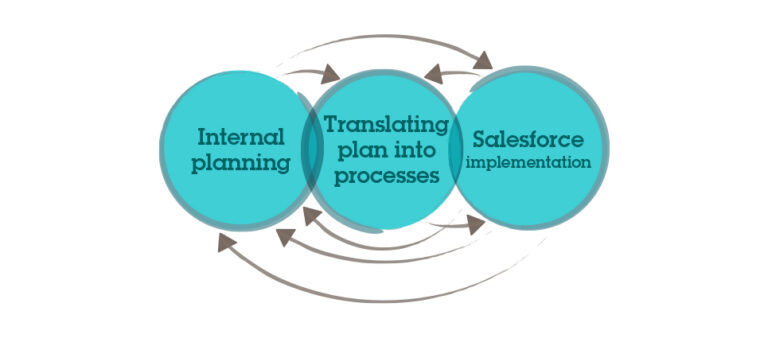
(*A handful of the working titles we considered before writing this blog article.)
Can we be frank? We are approached regularly by organizations who want to implement Salesforce, but they are nowhere near ready to hit go on the project. What do we do? We very politely ask them to come back when they have done some more groundwork. That way they know what they want to achieve, they understand what they want from us, we can deliver on these objectives.
Therefore the question we want to try and answer in this article, is really a mixture all of the above: how do you know when you are ready to talk to a Salesforce consultancy, and what can you do to prepare beforehand to make you sure you get the best value for money from the engagement?
If you want to bring in a new platform (or fix your existing platform) then your are embarking on a change management project. The actual implementation of the Salesforce platform is therefore one of the the logical outcomes of a much larger process of planning and consultation. It’s not to be confused with the project itself. With this in mind, here are a few home truths.
Put in other words, ‘More Thinking, Less Technology’. Going through a few rounds of iterations in the initial stages of the planning process, is not a problem, in fact it is advisable. This is the time to engage with your internal teams and scope out your objectives for the business. The questions here can guide you through to the type of answers that you will need to pin down internally, right from the start.
This is often the point that businesses get in touch with us, and it is a good time to have a talk. It is not a good time to start implementing Salesforce. You need to work out where the gaps are in your plans and that can be very difficult to see from an inside perspective. The best next step to take, is to translate the objectives you’ve identified into a series of business processes. Some organizations bring in an external business process development partner at this point (often a management consultant), to capture what’s happening in your organization currently, and what needs to change to best meet your goals.
The output will be a business process document and outline, technology agnostic, project brief that you can now use as a starting point to take to a Salesforce consultancy. You can of course perform this exercise yourself, if you have the right skills set in-house, but it is worth looking at the option of engaging with an external partner (and yes, we can make a recommendation if you are looking for an independent, professional practice who we’ve seen deliver great results)
The point is, this stage needs to happen and is the most commonly overlooked.
Management Consultancies are perfectly aware of what is possible in terms of technology. When it comes to translating business processes into reality on the Salesforce platform, you will need to bring in someone with this specific expertise. Salesforce is rigorous in its training requirements for delivery partners and for good reason. There is a high level of skill and training required to implement a truly robust, safe, straightforward solution that delivers on your requirements.
Can we be frank (again)? The no.1 reason people bypass any of the steps discussed above, is to save time and/or money. However an unsuccessful implementation, which needs ‘fixing’ again and again will cost you dearly. A good part of our business comes from rescuing projects that have run aground elsewhere, so we know what this looks like. For the execution of your plan we recommend using the agile project management methodology as it is iterative and responsive, and your end goals are well understood upfront. That way you can do it in small increments, limit error and ultimately get it right faster.
Finally, what we’ve outlined above is certainly a very simplified version of a complex process.
In addition to being a considerable change management exercise, this is an exercise in project management. Knowing which third party services to use, when and at what cost is ultimately going to be your call. The good news is that if you are considering implementing Salesforce, having an initial discussion with us is completely free and puts you under no obligation to place the project with us when you are ready to hit go. We know what we are good at and what we do well. The elements that we can’t provide you with, we’ll point you in the right direction and make the relevant introductions.

Our independent tech team has been servicing enterprise clients for over 15 years from our HQ in Bristol, UK. Let’s see how we can work together and get the most out of your Salesforce implementation.
Our website uses cookies for analytics, styling, and functional purposes. By accepting cookies, you'll get the best version of our website - and we'll be able to process some of your data to make that happen.